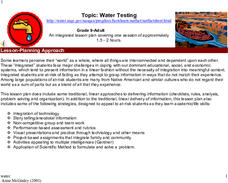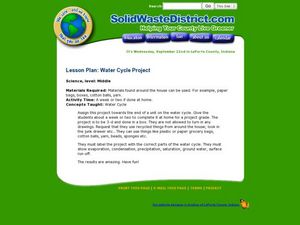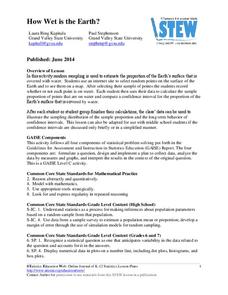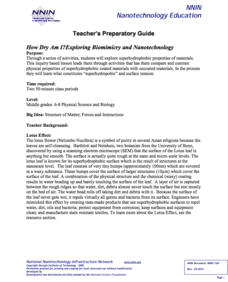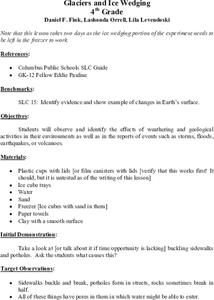Curated OER
Water Testing
Students work together to design their own experiment to test developed hypothesis about the minerals in water. As a class, they discuss the main components of water quality and describe the chemistry behind the hardness assay. They...
Curated OER
Water Facts And Media
Students engage in a lesson that is concerned with the facts surrounding water. They conduct research using a variety of resources to gather facts for the game of trivia. The information is used also to create a group presentation.
Curated OER
Water Survey
Students investigate water usage for the average home with the help of conducting a home survey. The information is collected and organized into a graphic format. Then they analyze the results to formulate an educated opinion about water...
Curated OER
Water Cycle Project
Students complete a water cycle project. In this Earth science lesson plan, students use recycled objects from around their homes to illustrate the water cycle. Students illustrate evaporation, condensation, precipitation, saturation,...
Curated OER
Water Quality in the Greenhills Stream
Seventh graders investigate and analyze the water quality of a nearby stream. They conduct a year-long study of water quality, collect and analyze data, take digital pictures for predictions, and create a web page.
Curated OER
Water Cycle Column
Students use common materials to construct a working model of the water cycle. They then observe and explain evaporation, condensation, precipitation and percolation as aspects of a continuing cycle. Students also complete worksheets and...
Curated OER
Final Project Presentations: Water Quality
Students synthesize the information they have been researching on water quality to evaluate the potential health risks in a region with arsenic contamination. They prepare and present a persuasive speech that incorporates visuals.
Curated OER
Where Did the Water Go? An Investigation in Scientific Methods
Students hypothesize what happened to the missing water. In this chemistry lesson, students test their hypothesis by designing an experiment. They record observations and report findings to class.
Curated OER
The Water in Our Lives: Be the Bug
Students examine a local water supply and create a fictional invertebrate specifically adapted to thrive in that environment. They write a short story from the invertebrate's point of view.
Curated OER
Water and Ice
Students explore what happens to water as it goes from solid to liquid and back. In this state of matter lesson, students observe, measure, and describe water as it changes state.
Curated OER
Exercise and Water
Second graders discover the needs of their body by trying different types of aerobic exercise. In this physical education lesson, 2nd graders analyze The Busy Body Book by glancing at the pictures inside and predicting what the content...
Curated OER
The Potential Consequences of Climate Variability and Change
Students analyze the impact of climate variability and change utilizing a broad span of topics over a wide range of grade levels. This three lesson unit is easily adapted for the various instructional levels listed.
DiscoverE
Siphon Pump
Defy the laws of gravity. A simple activity has learners create a siphon pump for water. The challenge is to get water to flow upwards through a tube.
Forest Foundation
Forest Watersheds
Where does the water we use come from? To understand the concept of a watershed, class members study the water cycle and then engage in an activity that simulates a watershed.
University of California
Plankton
Plankton: so much more than just a SpongeBob character. Three different activities have kids looking at both phytoplankton and zooplankton in pictures, as well as collecting their own samples (depending on your access to a saltwater...
PHET
Planet Designer: Kelvin Climb
It's time to get those creative juices flowing! This second lesson in a series of five continues allowing pupils to design their own planets. It the same format as the first, but, this time, allows students to alter greenhouse gases to...
American Chemical Society
Molecules in Motion
I heard that oxygen and magnesium were going out and I was like "O Mg." Pupils experiment with adding food coloring to water of various temperatures in order to determine how temperature impacts molecular movement. This is the...
Statistics Education Web
How Wet is the Earth?
Water, water, everywhere? Each pupil first uses an Internet program to select 50 random points on Earth to determine the proportion of its surface covered with water. The class then combines data to determine a more accurate estimate.
Carnegie Mellon University
Introduction to Climate
Begin a full lesson on climate change by demonstrating how carbon dioxide gas contributes to increased temperatures. Be aware that pressure inside the antacid-containing bottle in Activity 2 may cause the lid to fly off; keep viewers at...
National Nanotechnology Infrastructure Network
How Dry am I? Exploring Biomimicry and Nanotechnology
Help your classes feel like they can walk on water! An engaging inquiry-based lesson has young scholars experiment with different surface coatings. They make observations about their properties and how they relate to the surface tension...
University of Wisconsin
Conjunction Function
As part of a unit, this lesson familiarizes youngsters with components of a rain garden. They speculate about the role of an assigned component in contributing to a rain garden, and ultimately, in the health of the local watershed. Each...
Curated OER
Glaciers and Ice Wedging
Fourth graders observe and identify a variety of weathering and geological activities in the area in which they live. This focuses primarily on what happened during the Ice Age, and how, even today, glaciers are shaping and re-shaping...
Science Friday
Sublime Sublimation
Dry ice isn't dehydrated water, and young scientists learn why in this fascinating presentation. After watching a video, they complete three different activities using dry ice. Upon completion, they discuss the scientific principle.
Institute of Electrical and Electronics Engineers
Keep it Cool
This cool lesson plan is ideal for elementary engineers or physical scientists, especially when learning about heat transfer and insulation. After reading a page of background information, engineering teams collaborate to design and...
Other popular searches
- Water Cycle Activities K
- Activities on Water Sources
- Water Cycle Activities 3d
- Sand and Water Activities
- Pre K Water Activities
- Saving Water Activities
- Running Water Activities
- Recycled Water Activities
- Junior Water Activities
- Ocean Water Activities
- Prue K Water Activities
- Ocen Water Activities


